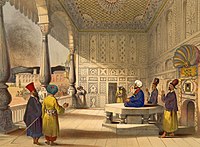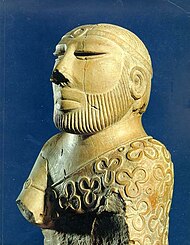Alakozai
| History of Afghanistan |
|---|
 |
| Timeline |
| History of Pakistan |
|---|
 |
| Timeline |
Alakozai (Template:Lang-ps - meaning descendant of Alako in Pashto) is the name of a Pashtun tribe in Afghanistan. Spelling variations include Alakoozi, Alekozai, Alekuzei, Alikozai, Alokozay, Alokozay, Alkozai, Alokzai, Hulakozai, Alecozay, Alikusi, and Alakuzei.
History

They are one of four tribes of the Zirak tribal confederacy of the Durrani Pashtuns.[1][2]
Their eponymous ancestor is claimed to be Alako, son of King Zirak Khan, son of Abdal, son of Tareen.[3]
Distribution
The Alakozai are found primarily in Helmand, Kandahar, Kabul, Laghman, Kunar Sarkani District and Herat provinces in Afghanistan, and form the majority of the population in the Sangin District. Jaldak, which is located 110 km northeast of Kandahar, is the original domicile of the Alakozai tribe.[4] The Alakozai people stretch from Farah to Kandahar, and constitute a majority in the Arghandab District of Kandahar.[5] The Arghandab district was given to the Alakozai tribe by King Nadir Shah, who brought down the Safavid empire of Persia with the help of the Alakozai in 1738.[6] Arghandab was referred to by the Greek historians as Arakozia, or the "Land of Arako/Alako".[7][8]
Notable individuals
- Sadullah Khan Alkozai of Chaghar Matti, Chief of Peshawar
According to the (Report of the regular settlement of the Peshawar district of the Punjab) by Edward George G . Hastings page 115 Publication date 1878 Publisher Printed at the Central Jail Press
- Mullah Naqib (c.1950 – October 11, 2007), famous freedom fighter during the Soviet–Afghan War, politician and peace maker from Kandahar. He was one of the most respected elders of the Alakozai Pashtun tribe in the Kandahar area.[6][9]
- Salim Khan and his son Salman Khan, Indian film actors, producers and television personalities.[10]
- Queen Zarghoona Alakozai (mother of King Ahmad Shah Durrani, founder of the Durrani Empire).[11]
- Abdul Ghani Alakozai, governor of Nadirabad[12] and chieftain of the Durrani,[13] under King Nader Shah.
- Juma Khan Alakozai, governor of Kashmir (1788–1792). His administration was faced by serious floods, Shia–Sunni riots and rioting by the Bambas. He died of dysentery in 1792.[14]
- Abdullah Khan Alakozai, governor of Kashmir (1795–1807, under King Zaman Shah Durrani).[14][15][16][17]
- Shah Aghasi Nawab Khan Alakozai, governor of Kashmir (18..–1840)
- Yar Mahomed Khan Alakuzei (circa 1842) Minister under King Shahzada Kamran Durrani.[18] Minister-regent at Herat, he served as Vizier of Herat from 1829 to 1842, and was the son of Painda Khan.[citation needed]
- Mohammad Khan Azimi (1851–1855), son of Yar Muhammad Khan and minister-regent at Herat. Herat was occupied by Iran from 1852 to 1853.[citation needed]
- 'Abd al-Ghani Khan Alikozai (maternal uncle of King Ahmad Shah Durrani), governor of Kandahar during Ahmad Shah Durrani's reign.[19]
- Zarghuna Begum Alakozai, wife of Governor Sardar Muhammad Zaman Khan of Jalalabad (1839 to 1842),[citation needed] and daughter of Khalu Khan Alakozai.
- Queen Alakozai, stepmother of King Dost Mohammad Khan of Afghanistan,[20] and wife of Sardār Pāyenda Khan, chief of the Barakzai clan.
See also
References
- ^ Giustozzi, Antonio (2012). Decoding the New Taliban: Insights from the Afghan Field (Reprinted ed.). Hurst Publishers. p. 197. ISBN 978-1-84904-226-0.
- ^ International Encyclopaedia of Islamic Dynasties; by Nagendra Kumar Singh; Published by Anmol Publications PVT. LTD., 2000; ISBN 978-81-261-0403-1
- ^ State and tribe in nineteenth-century Afghanistan: the reign of Amir Dost Muhammad Khan (1826-1863); by Christine Noelle, Christine Noelle-Karimi; Published by Routledge, 1997; ISBN 978-0-7007-0629-7; p. 384-385
- ^ The Hidden treasure: a biography of Pahtoon poets; by Muḥammad Hōtak, ʻAbd al-Ḥayy Ḥabībī, Abdul Hay Habibi, Khushal Habibi; Translated by Khushal Habibi; Published by Rowman & Littlefield, 1997; ISBN 978-0-7618-0265-5; p. 193
- ^ People of Ghazni, Program for Culture & Conflict Studies
- ^ a b Chayes, Sarah (2007-11-18). "A Mullah Dies, and War Comes Knocking". The Washington Post. Retrieved on 2008-07-20.
- ^ Afghanistan, Volumes 25-26 By Anjuman-i Tārīkh-i Afghānistān
- ^ The Khyber Gateway Alakozai
- ^ "Mullah Naqib - Losing an Ally". CBC.ca. 2007-10-15. Retrieved on 2008-07-03.
- ^ Swarup, Shubhangi (29 January 2011). "The Kingdom of Khan". OPEN. Retrieved 2014-07-17.
Salim Khan, scriptwriter and father of Salman Khan, remembers the Afghan tribe his family historically belongs to. "It is Alakozai," he says. "My family came to Indore 150 years ago, and worked as [part of the] cavalry in the time of the British." Salman Khan is a fifth-generation Khan in India. While completing his MA in Indore, young Salim Khan was spotted by some producers who had come to attend a wedding in Tarachand Barjatya's family. He then left for Bombay, where he acted in what he calls "indifferent roles" in 20-odd films before switching to scriptwriting.
- ^ Introduction about Ahmad Shah Baba's Life
- ^ The Kingdom of Afghanistan; George Passman Tate; Asian Educational Services, 2001; ISBN 978-81-206-1586-1; p. 64
- ^ The Kingdom of Afghanistan; George Passman Tate; Asian Educational Services, 2001; ISBN 978-81-206-1586-1; p. 58
- ^ a b Kashmir: A Wailing Valley; M. L. Gupta; Anmol Publications PVT. LTD., 2001; ISBN 978-81-261-0951-7; p. 65
- ^ The Kingdom of Afghanistan: a historical sketch; by G. P. Tate; Published by Asian Educational Services, 2001; ISBN 978-81-206-1586-1; p. 106
- ^ International Encyclopedia of Islamic Dynasties, Vol. 2 Afghanistan; Nagendra Kr. Singh; Anmol Publications PVT. LTD., 2000; ISBN 978-81-261-0403-1; p. 339
- ^ Catalogue of Coins in the Panjab Museum, Lahore; Lahore Museum; Richard Bertram Whitehead; 1934, p. 29
- ^ Dictionary of Indian Biography; by Charles Edward Buckland; Published by S. Sonnenschein, 1906; p. 228
- ^ State and Tribe in Nineteenth-Century Afghanistan: The Reign of Amir Dost Muhammad Khan (1826-1863): The Reign of Amir Dost Muhammad Khan (1826-63) (page 4)
- ^ Life of the amir Dost Mohammed Khan of Kabul: with his political proceedings towards the English, Russian and Persian governments, including the victory and disasters of the British army in Afghanistan. By Mohan Lal, 1846; p. 22
External links
- Alikozai Tribal Dynamics from the Tribal Analysis Center
